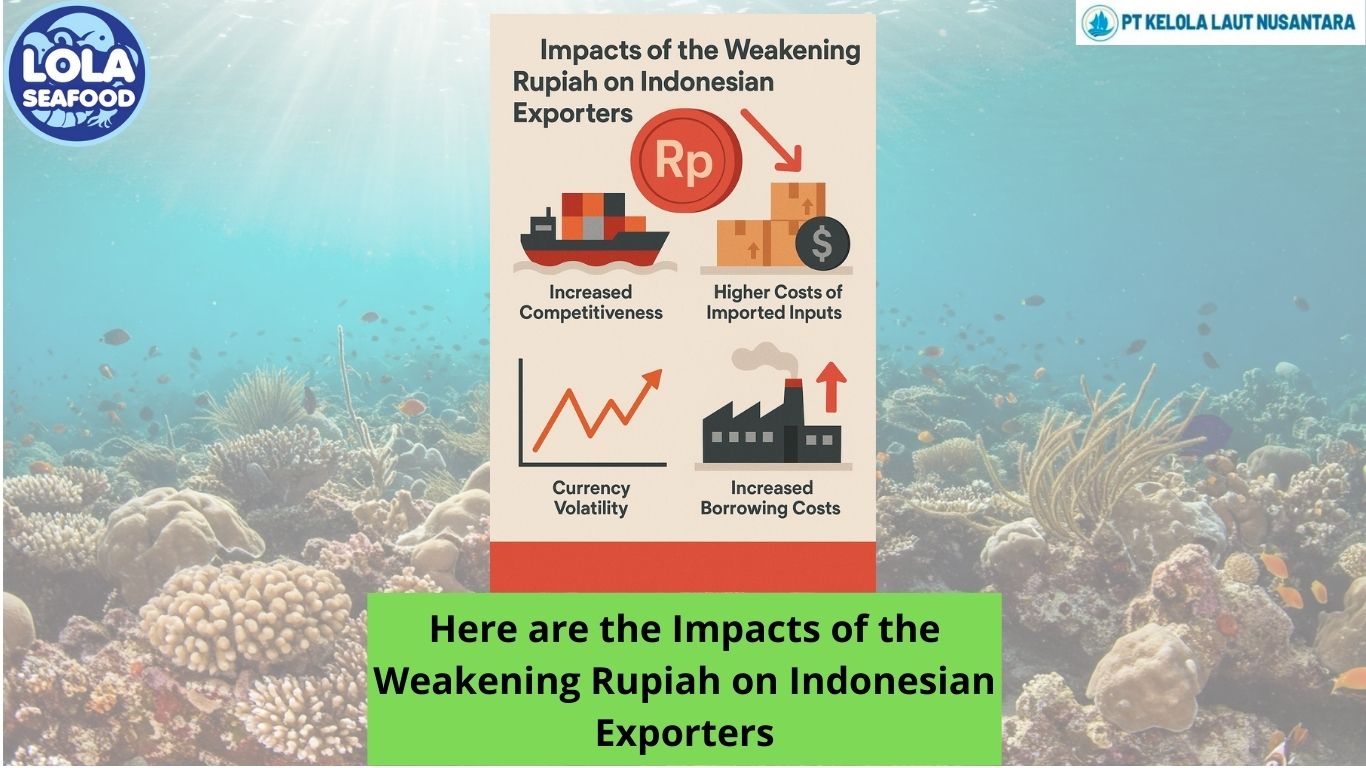Here are the Impacts of the Weakening Rupiah on Indonesian Exporters
By. Ely Kusniawati - 16 Apr 2025
Kelolalaut.com The weakening of the rupiah against major global currencies, particularly the US dollar, has significant implications for the Indonesian economy. While currency depreciation often raises concerns over inflation and capital outflows, it presents a mixed bag for Indonesian exporters. For many in the export sector, a weaker rupiah can actually act as a double-edged sword — offering both opportunities and challenges.
One of the most immediate impacts of a weaker rupiah is increased competitiveness for Indonesian exports. As the rupiah depreciates, Indonesian goods and services become cheaper for international buyers. This price advantage can boost demand for a wide range of export commodities — from palm oil, coal, and rubber, to manufactured goods like textiles, footwear, and electronics. Exporters paid in stronger foreign currencies, particularly the US dollar, enjoy higher profit margins when converting revenue back into rupiah.
Small and medium enterprises (SMEs), which often struggle to compete globally due to pricing constraints, may find new opportunities in international markets. A weaker rupiah allows these companies to offer more attractive prices without necessarily cutting into their profits, potentially enabling expansion into new markets or the growth of existing contracts.
However, this currency depreciation also comes with notable downsides, particularly for exporters dependent on imported raw materials. Many Indonesian manufacturers rely on foreign-sourced components, machinery, and raw goods, which become more expensive as the rupiah weakens. This erodes some of the profitability gained from favourable exchange rates and can lead to cost inflation, especially in industries such as automotive, electronics, and pharmaceuticals.
Additionally, while a weaker currency may temporarily boost export volumes, it can create long-term instability. Frequent and unpredictable exchange rate fluctuations complicate financial planning and pricing strategies. Exporters may face difficulty securing long-term contracts if buyers are concerned about currency risk. Hedging against currency volatility is an option, but it's costly and not always accessible to smaller firms.
The weakening rupiah also affects exporters through increased borrowing costs. Many Indonesian companies finance operations or expansion through foreign-denominated loans. As the rupiah declines, servicing this debt becomes more expensive, squeezing cash flow and limiting investment capacity. For capital-intensive sectors, such as mining and infrastructure-related exports, this can pose a significant barrier to growth.
Moreover, broader macroeconomic impacts should not be ignored. A weakened rupiah often coincides with higher inflation, which increases operational costs for exporters — from wages to transportation and energy. If inflation rises faster than the benefits gained from export revenue, the net advantage may diminish over time.
In conclusion, while the weakening rupiah provides short-term gains for Indonesian exporters through improved price competitiveness, it also brings with it challenges that can undermine those benefits. The impact varies across sectors, with commodity-based exporters generally gaining more than those reliant on imported inputs. For Indonesia to fully capitalize on the advantages of a weaker rupiah, supportive government policies, such as incentives for domestic production of raw materials and accessible financial instruments for hedging, will be critical. In an increasingly volatile global economy, resilience and adaptability remain the keys for Indonesian exporters navigating currency fluctuations.
If youre interested in our Black Pomfret Portion Cut and Black Pomfret Whole Round please do not hesitate to contact us through email and/or whatsapp.

The Legal Shark Value Chain: Identifying Critical Control Points for Cost Efficiency and Value Enhancement from Catch to Consumer

Global Trust Across Three Segments: How the HACCP System Ensures Premium Quality for Demersal, Pelagic Fish, and Legal Shark Product Utilization
.jpg)
Green Investment, Profitable Harvest: How Sustainability Practices Reduce Operating Costs in Fish Fillet Processing Plants (Skin-On and Skin-Less)
 in Meeting Global Protein Demand Sustainably.jpg)
Sustainable Aquaculture: The Role of Recirculating Aquaculture Systems (RAS) in Meeting Global Protein Demand Sustainably




